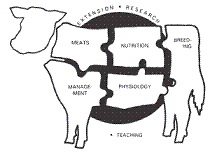Animal Science, Department of

Nebraska Beef Cattle Reports
Date of this Version
2021
Citation
Published in 2021 Nebraska Beef Cattle Report, University of Nebraska Extension Publication MP110
Abstract
The purpose of dry aging is to develop novel favors and other sensory characteristics different from wet aged meat. However, leaving meat exposed to air for an extended period of time can have negative effects on meat quality. As the meat is exposed to oxygen for an extended period of time, lipids are oxidized resulting in compounds that negatively affect favor. In this study, oxygen concentration was regulated along with time, temperature, humidity, and air flow. The purpose of oxygen regulation was to determine the effect of oxidation on the quality, specifically flavor preference, of dry aged meats. Sensory analysis via untrained panelists detected no flavor differences between traditionally dry aged meat and meat dry aged in anaerobic conditions, despite anaerobic dry aged samples having lower lipid oxidation values. Further sensory analysis via highly trained panelists is being conducted to determine if lipid oxidation affects dry aged beef flavor.
Included in
Large or Food Animal and Equine Medicine Commons, Meat Science Commons, Veterinary Preventive Medicine, Epidemiology, and Public Health Commons


Comments
Copyright © 2020 The Board of Regents of the University of Nebraska.